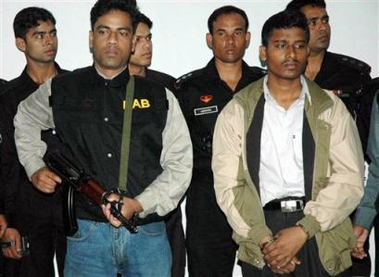|
Bangladesh police arrest suspects in bombing case
(AP)
Updated: 2005-12-15 09:18
Bangladesh's security forces arrested the suspected military commander and
the alleged accountant of a banned Islamic group blamed for a wave of deadly
bombings in the country, claiming a breakthrough Wednesday in their fight
against the militants.
Investigators interrogated the men in hopes they could help crack Jumatul
Mujahideen Bangladesh, which officials say carried out attacks that have killed
22 people and wounded scores since November.
"We hope to get some very important information from them," said Masuq Hassan
Ahmed, a spokesman for the elite Rapid Action Battalion, which includes police
and soldiers.
Jumatul Mujahideen Bangladesh wants to establish strict Islamic rule in the
country of about 140 million people, which was set up as a secular state when it
won independence in 1971 from Pakistan, where Islam is the official religion.
Elite forces caught Ataur Rahman, the group's reputed military commander, in
a raid late Tuesday at Dhaka's Tejgaon Polytechnic College, where he apparently
had gone to meet someone, Ahmed told reporters.
Rahman, also known as Sunny, denied involvement in the bombings, but has
admitted to being a member of Jumatul Mujahideen and the younger brother of the
group's fugitive leader, Shaikh Abdur Rahman.

Bangladesh Special Security Force soldiers
guard Ataur Rahman, front right, military commander of Jamatul-Mujahideen
in Dhaka, Bangladesh, Wednesday, Dec. 14,
2005.[AP] | Agents also nabbed Fariduzzaman Swapan, who is believed to be an accountant
for Jumatul Mujahideen, in a separate raid Tuesday in Dhaka, Ahmed said.
Swapan was being investigated for suspected money laundering because he
maintains several bank accounts in his own name, although he denies any ties to
the militants, Ahmed said.
Neither of the men, both of whom are in their late 30s, have been charged.
On Wednesday, police uncovered two weapons caches believed to belong to the
militants, although officials would not say if the raids resulted from
information provided by the suspects.
Police found dozens of grenades and revolvers along with explosives,
detonators and other bomb-making materials in a house in Dhaka, Ahmed said.
Police in the southeastern port of Chittagong also raided a shanty, arresting
two suspected militants and seizing detonators, explosives, fake passports and
items that could be used to disguise bombs, like books with pages cut out,
police officer Mohammad Osman Gani said.
Police also said they recovered hundreds of books, leaflets and cassettes
about jihad, or holy war, during both raids.
Critics say the government, ruled by a coalition that includes two Islamic
parties, initially was hesitant to go after the group when the militants emerged
last year in northern Bangladesh.
But after a Dec. 8 suicide blast that killed eight people, including the
bomber, in a town north of Dhaka, officials vowed tough action against the
group, which claims to have 10,000 members.
Officials say they are investigating Bangladeshi media reports that members
of the group fought with mujahedeen against the Soviet occupiers of Afghanistan
in the 1980s.
So far, the militants have largely targeted government offices and the
courts, although a cultural group that had recently staged anti-militant
concerts appeared to be the target of last week's suicide
bombing.
|